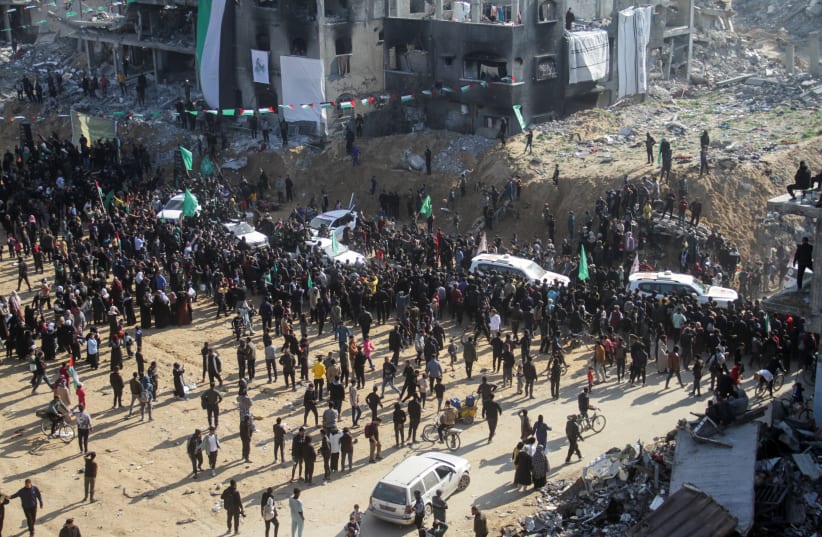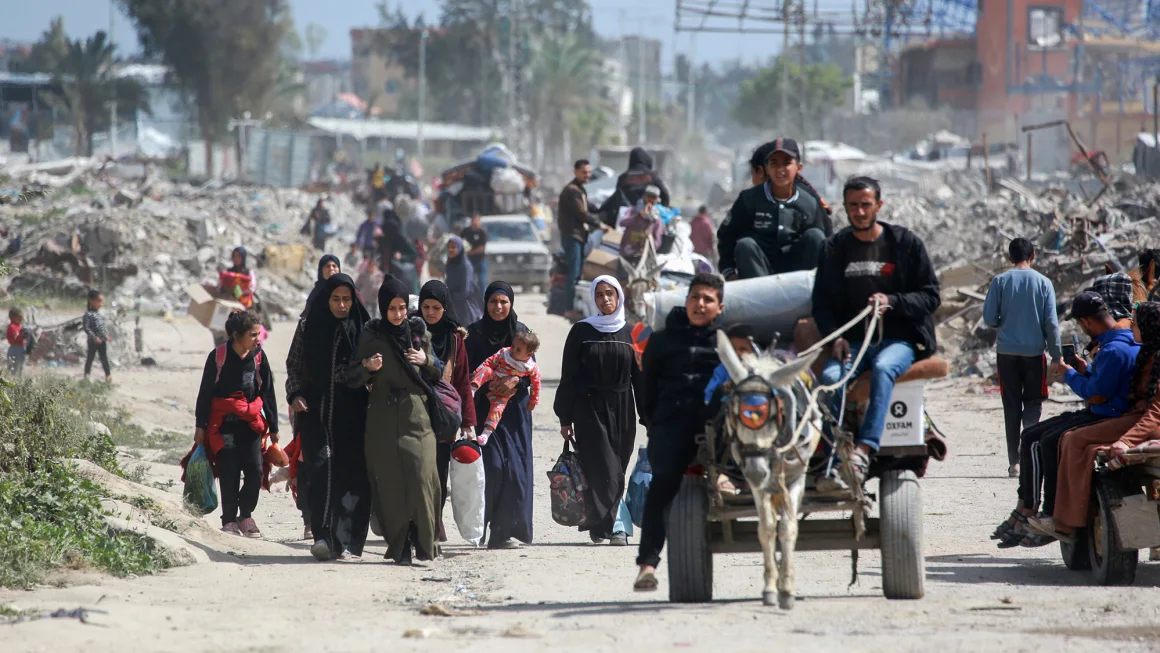Foreign
Blinken to G7: Iran, Hezbollah may begin attack on Israel on Monday – report

Unlike the Iranian strike against Israel on April 13, the possible scenarios are less clear.

An attack by Iran and Hezbollah against Israel could begin as early as Monday, US Secretary of State Antony Blinken told his counterparts from the G7 countries in a Sunday conference call, Walla reported on Monday, citing three officials familiar with the matter.

The purpose of the call was allegedly to coordinate US’s closest allies and make last-minute attempts to put diplomatic pressure on Iran and Hezbollah to minimize their retaliatory actions.
Separately on Sunday, three US and Israeli officials also told Axios reporter Barak Ravid that the attack could occur on Monday. An Israeli official also told CBS News that while Iran’s April 13 attack was mostly thwarted, Israel was anticipating a “more aggressive” retaliation this time around.
The sources told Walla that, in his meeting, Blinken emphasized that the US believes that Iran and Hezbollah will retaliate, but unlike the Iranian strike against Israel on April 13, the possible scenarios are less clear.
Blinken said that the US does not know the exact timing of the attacks but stressed that they could begin as early as the next 24-48 hours – that is, starting on Monday, the sources told Walla.
In the April 13 attack, Israel was assisted by the United States, Great Britain, France, Qatar, Egypt, Jordan, Saudi Arabia, the United Arab Emirates and Bahrain in intercepting the Iranian drones and missiles. The coalition successfully intercepted 99% of the missiles.
On Monday morning, Western diplomats told KAN that it would be possible to restore the regional coalition that confronted the April attack. The diplomats told the Israeli state broadcaster there was no reason the parties would not cooperate again and that “everyone has an interest that the event does not turn into a regional war.”
US attempts to deescalate
The sources said to Walla that Blinken asked the other foreign ministers to exert diplomatic pressure on Iran, Hezbollah, and Israel to exercise maximum restraint.
Blinken also told G7 foreign ministers that the buildup of US forces in the region was for defensive purposes only, the sources said.
It was announced on Sunday that the US military will deploy additional fighter jets and Navy warships to the Middle East, the Pentagon said on Friday, as Washington seeks to bolster defenses following threats from Iran and its allies Hamas and Hezbollah.
According to the sources, Blinken said that the goal is to limit the impact of the attacks by Iran and Hezbollah on Israel and emphasized that this is the best way to prevent an all-out war.
One source who was in the conversation said that Blinken sounded frustrated when he briefed the other ministers on the talks with Israel regarding the hostage deal and a Gaza ceasefire.
“We felt we were close to a breakthrough in the Gaza deal, but then the assassination happened in Tehran. Now we need the deal more than ever,” Blinken said.
American Defense Minister Lloyd Austin spoke on Monday with Defense Minister Yoav Gallant. He reiterated the firm support of the United States for Israel’s security and its right to self-defense against the threats from Iran, Lebanon, Hezbollah, the Houthis, and other terrorist organizations supported by Iran. They discussed the reinforcement of American forces, which they said are needed to protect US personnel, support the defense of Israel, and deter and reduce tensions in the region.
Austin also expressed his firm support for a ceasefire in Gaza and a deal to release the hostages.
The commander of the US Army’s Central Command, General Michael Korilla, arrived in Israel on Monday to finalize coordination with the IDF in preparation for the possible attack by Iran and Hezbollah, senior Israeli officials said.
Preparations on the Home Front
The G7 ministers reportedly expressed concern at the “heightened tension” in the region and called on “all involved parties once again to refrain from perpetuating the current destructive cycle of retaliatory violence, to lower tensions and engage constructively toward de-escalation.”
Prime Minister Benjamin Netanyahu held a meeting on Sunday night with Defense Minister Gallant and the heads of the military and the intelligence community to discuss the impending attack by Iran and Hezbollah and the possible Israeli response, senior Israeli officials said.
“Iran and its agents are looking to surround us with a stranglehold of terror. We are determined to stand up to them on every front and in every arena – near and far. Whoever seeks to harm us will pay a very heavy price,” Netanyahu said on Sunday.
An Israeli official told NBC news on Monday that Israel is preparing to endure a multi-day attack from Iran and Hezbollah.
“They’ll just try to wear us out,” the official told NBC, adding that, as opposed to Iran’s attack in April, the coming attacks could span several days as Hezbollah fires at Israel from the north and Iran launches longer-range weapons from the east.
The regional picture
Other countries in the region are also preparing for a dramatic escalation and are making efforts to try and prevent it. Multiple countries, such as Japan and Turkey on Monday morning, have asked citizens to leave Lebanon due to fear of escalation.
Jordanian Foreign Minister Ayman Safadi made a rare visit to Tehran on Sunday – the first such visit by a Jordanian foreign minister in almost a decade. Jordan is allegedly concerned about an Iranian missile and drone attack that would be expected to pass through its airspace. During the attack on April 13, Jordan intercepted Iranian drones that were making their way towards Israel and allowed American and Israeli fighter jets to use its airspace to intercept Iranian drones and cruise missiles. Safadi met with the acting Iranian Foreign Minister Ali Bagheri and conveyed him a message from King Abdullah II to the President of Iran, according to a statement from the Jordanian Ministry of Foreign Affairs. “I came to express concern about the escalation in the region. I did not come here to convey a message from Israel or to receive a message from Israel,” Safdi said after his meeting in Tehran.
Several Iranian officials vowed that the country would avenge Hamas leader Ismail Haniyeh’s assassination, as Israel remains on high alert for a potential attack and the United States is sending additional forces to the region.
Iran’s Islamic Revolutionary Guards Corps said on Saturday that revenge would be “severe and at an appropriate time, place, and manner,” blaming the “terrorist Zionist regime” for Haniyeh’s death.
However, Iran’s foreign ministry spokesperson Kanaani said on Monday that Iran is not looking to escalate regional tensions but believes it needs to punish Israel to prevent further instability.

Foreign
Hamas claims spokesperson killed in Israeli strike on northern Gaza

Earlier this week, Israel killed Ismail Barhoum, a member of Hamas’ political office, and Salah al-Bardaweel, another senior leader.

Hamas spokesman Abdel Latif al-Qanou was allegedly killed in an Israeli airstrike on northern Gaza, Hamas-affiliated news agency Shehab reported on Wednesday night.

Al-Qanoa was one of Hamas’s most prominent spokesmen in Gaza, and while he avoided media appearances during the months of fighting, he gave multiple interviews to Arab news channels after the ceasefire.
Al-Qanoua was killed when his tent was targeted in Jabaliya, the Hamas-run Al-Aqsa television reported. The same strike wounded several people, medical sources said.
Earlier this week, Israel killed Ismail Barhoum, a member of Hamas’ political office, and Salah al-Bardaweel, another senior leader.
Both Bardaweel and Barhoum were members of the 20-member Hamas decision-making body, the political office, 11 of whom have been killed since the start of the war in late 2023, according to Hamas sources.
Tents for Palestinians seeking refuge are set up on the grounds of a United Nations Relief and Works Agency for Palestine Refugees (UNRWA) centre in Khan Yunis in the southern Gaza Strip on October 19, 2023, amid the ongoing battles between Israel and the Palestinian group Hamas (credit: MAHMUD HAMS/AFP via Getty Images)
The IDF has yet to comment on the alleged elimination.
Increased IDF pressure in the Gaza Strip
Since fighting in Gaza was renewed at the beginning of last week, the IDF has killed 150 terrorists, including 10 top Hamas officials, The Jerusalem Post learned Tuesday.
In certain areas, the military has entered a full kilometer into Gaza, such as around the Nitzanim Corridor in central Gaza.
In addition to central Gaza, Beit Lahia, Beit Hanoun, parts of Khan Yunis, Shaboura, and Tel Sultan, the IDF has been evacuating and moving into Jabaliya.

Foreign
Dead Nigerians, Africans, others without will may lose unclaimed estates in UK

Hundreds of unclaimed estates reveal untold stories of African migration, wealth, and family ties left behind.
Thousands of people die every year in the United Kingdom without leaving a will or identifying next of kin, and among them are many Nigerians and other Africans whose estates—ranging from property to savings—remain unclaimed.
The UK government’s latest list of unclaimed estates, updated daily, includes over 170 entries connected to African-born individuals, with Nigerians making up a significant portion of the cases.

A Legacy Lost
For many migrants, the UK became a home away from home—a land of opportunity where they built wealth, purchased property, and created a life.

However, the absence of a will often results in their assets being classified as “bona vacantia” (ownerless goods), leaving them to the custody of the Crown.
Families back in Africa are frequently unaware of these estates, leading to a permanent loss of assets.
Cases like that of Adenike Adebiyi, who passed away in Hackney, London, in 2004, or Solomon Adekanmibi, who died in Colchester, Essex, in 2021, highlight the consequences of dying intestate.
With no identified next of kin or missing documentation, their estates remain unclaimed, and their legacies risk being forgotten.
Why It Matters
This phenomenon underscores a critical issue: many African families are unaware of their relatives’ financial situations abroad.
Migration often disrupts communication, and without clear documentation, the wealth built overseas remains beyond reach.
The loss isn’t just financial—it’s deeply cultural and emotional. Unclaimed estates represent untold family histories, connections, and the struggles of migrants who built their lives in the diaspora.
The Challenges
Lack of Awareness:
Most families in Nigeria and other African countries are unaware of their relatives’ estates abroad or how to access them.
Genealogical Gaps:
The information provided in official records is often incomplete. For example, many entries in the UK unclaimed estates list lack detailed family history or next-of-kin information.
Cultural Hesitations:
In many African cultures, discussing death and wills is considered taboo, leading to reluctance in planning for asset distribution.
A Call to Action
African governments, community organizations, and legal professionals need to raise awareness about this issue.
Here’s what can be done:
Encouraging Will Writing: Migrants in the diaspora should be educated about the importance of drafting wills to protect their assets.
Genealogical Support: Families in Africa can be assisted in tracing unclaimed estates through local or international partnerships.
Public Awareness Campaigns: Social and traditional media can highlight the importance of estate planning and share resources for families.
How to Check the List
The UK government maintains a public Unclaimed Estates List that is updated daily.
Families can search the list by name, place of birth, or other identifiers to check for potential claims.
Final Thoughts
For many Nigerians and Africans in the UK, their unclaimed estates represent more than just wealth—it’s a story of migration, resilience, and identity.
By addressing this growing issue, families can reclaim their heritage, and the legacy of those who journeyed to the diaspora need not be forgotten.
Here is the latest daily update as of March 24, 2025. Check the list

Foreign
Israel approves controversial proposal to facilitate emigration of Palestinians from Gaza

Israel’s security cabinet has approved a controversial proposal to facilitate Palestinian emigration from Gaza, a move critics warn could amount to ethnic cleansing.

Israeli Finance Minister Bezalel Smotrich on Sunday said the security cabinet approved the proposal by Defense Minister Israel Katz to organize “a voluntary transfer for Gaza residents who express interest in moving to third countries, in accordance with Israeli and international law, and following the vision of US President Donald Trump.”

The decision marks a remarkable endorsement of a plan once considered a far-right fantasy – and comes despite the prime minister’s earlier pledge not to permanently displace Gaza’s civilian population.
Critics have said that any mass displacement of Gazans in the midst of a devastating war would amount to ethnic cleansing, an act associated with war crimes and crimes against humanity under international law. Israeli officials have countered that emigration would be voluntary and in line with international legal standards.
But aid groups argue that Israel’s war has made life in Gaza nearly impossible. Martin Griffiths, the United Nations’ top emergency relief official, has called the enclave “uninhabitable,” saying its people are “witnessing daily threats to their very existence.”
The Israeli approval would establish an administration within the defense ministry “to prepare and facilitate the safe and controlled movement of Gaza residents who wish to voluntarily move to third countries,” according to a statement from the defense ministry.
Its work would include “establishing movement routes, pedestrian checks at designated crossings in the Gaza Strip,” and infrastructure to enable people to leave.
Israeli officials have presented the plan as a fulfillment of a desire by Trump to take over Gaza, expel its Palestinian population to neighboring countries and turn it into a Middle Eastern “riviera.”
The Palestinian Authority’s Minister of State for Foreign Affairs Varsen Aghabekian Shaheen told CNN’s Becky Anderson last month that Palestinians “are steadfast to stay in their land and will not move.”
Trump’s ‘vision’
Katz said Sunday that Israel is using “all means to implement the vision of the US president,” according to the defense ministry statement.
This month, Trump appeared to backtrack on his comments about displacing Palestinians, telling reporters that “nobody is expelling any Palestinians.” Steve Witkoff, the US special envoy to the Middle East, said last month that the US initiative to rebuild Gaza won’t necessarily amount to an “eviction plan” and that it was designed to “shake up everybody’s thinking.”
Last year, Israeli Prime Minister Benjamin Netanyahu said his country had no intention to displace Palestinians or occupy Gaza.
Related articleTrump says ‘nobody is expelling Palestinians,’ weeks after saying they should be moved to Arab states
“I want to make a few points absolutely clear: Israel has no intention of permanently occupying Gaza or displacing its civilian population,” Netanyahu said in a video statement in January 2024.
Trump’s proposal has, however, brought the idea further into the mainstream, with Israeli politicians now openly discussing mass emigration of Gazans as a solution to the war. And Katz last week said that Israel may maintain a permanent presence in the enclave.
Israeli rights group Peace Now criticized the plan, saying “the establishment of the administration to expel Palestinians from Gaza is one of the stupidest moves by a government that has lost all direction and logical thinking.”
The prospect has also drawn sharp rebuke from Arab leaders, especially Egypt and Jordan, who would be expected to absorb the large number of expelled Palestinians. Experts have also warned that displacing Palestinians would further destabilize the region and threaten the security of neighboring states.
Smotrich said Sunday that the security cabinet also approved the expansion of Jewish settlements in the occupied West Bank, noting that 13 areas in the West Bank would be split from existing settlements and would be recognized as independent settlements.
“Instead of hiding and apologizing – we are raising the flag, building, and settling. This is another important step on the path to actual sovereignty in Judea and Samaria,” he said, using the name by which Israelis refer to the West Bank.
The Yesha Council, an umbrella body representing Jewish settlements, said that as of January 2024, there were 150 settlements in the West Bank.
It said that the decision exposes a “long-standing lie that (Israel) does not establish new settlements, but only ‘neighborhoods’ of existing settlements” and that it is “another nail in the coffin that the Government of Israel is preparing for the only chance for a future of peace and security.”
A statement sent by Smotrich’s office said the move comes against “the backdrop of the approval of tens of thousands of housing units in Judea and Samaria and represents another significant step in the process of normalizing and regulating the settlement.”
Smotrich and other right-wing ministers have been pushing an aggressive expansion of settlements on the path to declaring Israeli sovereignty over the West Bank, which would be in defiance of international law and UN Security Council resolutions.
Israel says it will maintain ‘permanent’ presence in Gaza unless hostages are freed

-

 Foreign1 week ago
Foreign1 week agoHouthis declare Ben-Gurion Airport ‘no longer safe’ after renewed Gaza fighting
-

 News1 week ago
News1 week agoWhy Christ Embassy’s Pastor Chris holds Abuja mega crusade – Fisho
-

 News2 days ago
News2 days agoKogi Governor, Ahmed Usman Ododo salutes Tinubu at 74
-

 News1 week ago
News1 week agoUmeh denies receiving $10,000 with other 42 Senators to support state of emergency in Rivers
-

 Crime1 week ago
Crime1 week agoGhana’s anti-drug agency nabs Nigerian drug kingpin, Uchechukwu Chima, seizes $2.1m worth of cocaine, heroin
-

 News2 days ago
News2 days agoPlateau LP stakeholders endorses Barr Gyang Zi’s defection to APC
-

 News7 days ago
News7 days agoAgain, explosion rocks gas facility in Rivers
-
News11 hours ago
Abia: LG Chairman, Iheke accused of using soldiers to detain IRS agent, claims Governor Otti’s support

















